#Abraham Lincoln Center
Explore tagged Tumblr posts
Text

This building now serves as the Northeastern Illinois University Jacob H. Carruthers Center for Inner City Studies, 700 East Oakwood Boulevard, Chicago.
Originally the Abraham Lincoln Center, the design was Frank Lloyd Wright's first large public commission, and he was chief designer of the project from 1898 until 1903. Dwight Heald Perkins was associate architect. The client was Wright's uncle, the Reverend Jenkin Lloyd Jones of All Souls Church. The building was completed as a settlement house in 1905, after both architects had left the project.
#architecture#chicago#buildings#Abraham Lincoln Center#Frank Lloyd Wright#Dwight Heald Perkins#Carruthers Center#NEIU#Jenkin Lloyd Jones
3 notes
·
View notes
Photo





(via Muhal Richard Abrams - by Tyler King)
4 notes
·
View notes
Text
The Evolution of Ballet at Lincoln Center: A Review of American Ballet Theater's Fall Season
The Evolution of Ballet: A Night at Lincoln Center Ballet is an art form that thrives on evolution, and there’s a glimmer of hope as two distinctly different ballets took center stage. On Wednesday, American Ballet Theater inaugurated its fall season at Lincoln Center with the premieres of works by Gemma Bond, a former company dancer, and Kyle Abraham, a contemporary choreographer. Notably, this…
#American Ballet Theater#Ballet#ballet evolution#ballet performance#contemporary choreography#dance review#Gemma Bond#Kyle Abraham#La Boutique#Lincoln Center
0 notes
Text
First Principles: If Destruction Be Our Lot, We Must Ourselves Be Its Author and Finisher. As A Nation of Freemen, We Must Live Through All Time, Or Die By Suicide
“If destruction be our lot, we must ourselves be its author and finisher. As a nation of freemen, we must live through all time, or die by suicide.“ – Abraham Lincoln Lincoln spoke these words in the 1838 Springfield Lyceum address that the Democrats would rather us not be aware of or its more popular paraphrase of this speech. This speech may be found here: Speech to the Young Men’s Lyceum of…

View On WordPress
#Abraham Lincoln#All Time#Author and Finisher#Destruction#Die By Suicide#First Principles#Live#Nation of Freemen#Our Lot#Ouselves#Speech To the Youngman&039;s Lyceum of Springfield (1838)#U.S. Constitution Center
0 notes
Text
Time Travel Book: MYSTERY OF THE STURBRIDGE KEYS, subtitled CHRISTMAS UNLOCKED
This book is a wonderful resource for teachers, parents, and home schoolers who wish to teach pre and ancient history to their junior high school students. This books sparks curiosity and critical thinking skills so needed in the world of today. It is a meaningful addition to any reading and language skills curriculum in both secular and Christian settings. Brie is the thirteen-year-old…

View On WordPress
#Abraham Lincoln#Annie&039;s Country Kitchen#Apostles Paul#B.T.&039;s Smokehouse#Babylonian Emoire#book about Sturbridge#Brimfield Antique Center#Charles Darwin#Charles Dickens#Christmas#Christmas By CandleLight#Dodanim#God#Greece#Greek Empire#Harriet Tubman#Harriet Tubman on the new $20 bill#Harrington Hospital#Jesus#McClean Hospital#Mede Empire#Nephilim#Noah#Panic of 1937#Persian Empire#Roman Empire#Sanctuary of the Great Gods#Sermon on the Mount#Southwick&039;s Zoo#Stephen
1 note
·
View note
Text
Louisiana Missouri, a Historic Drive
Just 90 miles north of St. Louis, and 30 miles south of Hannibal is Louisiana, Missouri. This town of around 3,330 is filled with art and history, my husband and I traveled to this fun River town. My brother-in-law Kim and his wife Terri came along for the ride, architecture and to see information on this town where the 13th Amendment came to light. Before crossing out of Illinois, we drove…

View On WordPress
#13th Amendment#50-mile art corridor#Abraham Lincoln in Pittsfield Illinois#Books on the Square#Civil War#Colorfest#Confederate States of America#facade#famiy#Fat Boys#Hannibal Missouri#Henry Lay Center#Historic area Pittsfield Illinois#Historic Louisiana#Illinois#James McElwee#John Brooks Henderson#Louisiana Flowers and Gifts#Louisiana Missouri#Louisiana Riverfront Park#Louisiana Walking Tour#Lyman Trumbell#McElwee Cemetery#Mesker Brothers#Mesker Buildings#Morgan Raiders#murals#National Registry of Historic Places.#Overlooks at the River Front#Pittsfield Illinois
1 note
·
View note
Text
thinking about the affective link between vampires and slaveownership in american literature. a surprising number of the most popular works of vampire fiction set in america, from the vampire chronicles to the twilight saga to abraham lincoln, vampire hunter (2012), has one or more vampire characters either personally own a plantation and slaves or fought to defend slavery. and the interesting thing is you would think this is largely because of the parallels between vampirism and enslavement as the ultimate dehumanization and violation of another person’s will, or because the american civil war has a historical narrative as the ultimate battle against the forces of evil lurking among us, but abraham lincoln, vampire hunter (2012) is the one work i’ve seen that actually presents it from that angle. most other works, including interview with the vampire and twilight, just present the plantation as flavoring, with the humans that the vampire has openly and legally enslaved relegated to set dressing. which suggests to me that those works are using it as the traditional solution to the traditional american gothic problem—that is to say, that gothic fiction typically centers around ancient and deep-rooted aristocratic families, something a settler colony like america obviously lacks, so american writers from edgar allan poe onwards who wanted to write gothic fiction in as non-revisionist a style as possible seized upon the pseudo-aristocracy of the southern gentlemen for their setting. this doesn’t make it any less of a lazy and unexamined choice on the authors’ part, but it does offer an interesting insight into america’s affective geography
426 notes
·
View notes
Text

The day you found out you had won Jason Kelces Beard Challenge was the best day of your life. The challenge was simple: put together a snap or tiktok video of how to get a beard as good as Jason and the top winner would win a day with Jason. Your video was a long shot: you made a tiktok showing how if you mixed essence of dwarf, with a bit of neanderthal, and just a splash of viking inside Abraham Lincoln's hat and applied it to your face, you'd look as good as Jason. It did t get very many views but Jason loved it. The next thing you knew you were in Philadelphia meeting the man himself at the airport.
The tour of Philadelphia through Jason Kelces eyes was a lot of stops at places he loved to eat. Steak sandwich, sausage, pizza, ice cream. The man just loved to eat. As the day dragged on just as Afternoon turned to evening he took you to Lincoln Field, his home turf. There was no game and the place was locked down, but that was nothing a few signed balls couldn't handle.
He took you to the locker room, the place where he told you he feels most free to be himself. You both sat down on the bench in front of his locker. He took out a case of bud light and cracked one open. The man drank so much bud lite you swore he was sponsored by them.
He told you to be quiet. To just listen to the sound of the room. To drink it in and become one with the soul of real American football.
The only thing you heard was the bench breaking as Kelce leaned forward and let out a fart with a satisfied grunt.
"Oh, sorry," he said, not sounding very sorry.
"Really? " you said. You looked at him, almost appalled that he would do that with you right next to him.
Jason turned and gave you a wink. "Dont tell me you don't find farts funny. Your a guy. All guys love farts."
You rolled your eyes. "Not really."
"What about this one," he said and let loose a loud bassy fart.
"God stop it, it's so gross," you said as you slid away, but suddenly found yourself pressed against the wall of the locker room. "Seriously dude. What the fuck?"
"C'mon," Jason said as he moved over towards you. “I warned you. Remember when I ate that large sausage with pickled garlic ave said ‘were in trouble later’? What do you think I meant.” and placed a hand on your chest, giving you a bit of a push. "Don't be a prude."
You were caught between a wall, and a wall of beef holding you in place. "Seriously, stop it".
"Can't stop. Won't stop," he said still pressing you in the wall. His eyes were the kind of dull that only cheap low quality beer can make the."You know I bet you never had an older brother. Between me, my dad and Travis we learned to appreciate farts. My dad told me that the best cure is exposure. So to get you up to speed I think I need to gas you more"
He pressed into you and lifted up his keg and let loose with a fart so powerful it echied through the empty locker room.. You struggled to get away from the horrible stench, but couldn't escape.
"No, don't do this," you said as it overwhelmed you.
He turned around and pressed his huge soft center lineman ass in your face, the soft fabric of his shorts spreading across your face like warm dough. It was too much, and you were powerless to stop it. His asshole flexed and relaxed as it sent out a long drawn out series of wet sounding farts. You gagged as the air around you filled with the horrid odor.
"Fuck that was a good one," he said, not budging an inch. “Three point stance just rips these farts out of me.”
"I think I'm going to puke," you said, trying not to vomit.
"If your gonna puke, aim that way, I like these shorts." he said pointing. "Do you think it's funny yet?"
"No!" You coughed.
"Alright you asked for it" he presses his ass harder, wedging your nose on his cheeks. He let loose with a rapid fire volley of farts that left you breathless and coughing. He backed away, chuckling at you.
"God, fuck, that's rank!" You coughed. You tried to breathe fresh air but the locker room had been total polluted by Kelces ass.
"Come on. You don't have to love them, but you gotta at least admit they are funny and manly now. How can you like football and not think farts are funny." he let you stew and come up with an answer.
"Fuck...no," you say.
He shrugged. "Ok. Your loss," he said and pressed his ass in your face again.
"No! Please. God. No. Fuck!"
"What's it going to take? Do I need to pull my shorts down and give you a bare ass stinkface?" He said, pressing even harder.
"No! No more. Fine. They're fucking funny," you cried.
"What?" He said. "I couldn't hear you"
"They're funny!"
"Now are you just saying that to make me stop?"
"No, I mean it. They are funny and they are manly."
"Well, if it's funny you won't have a problem asking me to do it a few more times so you can properly laugh. Right?"
"Uh...fine. Sure. Just, please, no more, I can't take it."
He turned and farted once. "Laugh. Laugh hard and long and deep." He was getting frustrated that you weren't laughing. "Seriously come on guy. This is just as bad for me as it is for you. It's hard to hold this position and if I keep farting I'm going to have to take a dump soon"
"Oh god no!"
"Laugh dammit!" He yelled.
"No, no, I can't."
"Fine then," he said. He pulled you down and set you face up on the bench. He loomed over you. "Ok big fucking guns time" he pulled down his shorts and hovered his raw hairy bear ass over your face.
"Oh shit, dude please don't!" His as was a beast. This close you could make out the rough skin. His ass had taken a pounding over the years and looked like a hefty bag overfilled with cottage cheese. The hair on his crack was dense and black.
"Do you think this is funny?"
"Yes, yes, fuck, yes!" You were sobbing, your body convulsing.
“Good. Then you'll find this hilarious.” he sat down. He sat down hard. He rocked back and forth, the wiry hair of his ass crack scouring your face. He dug deep like he has an itch he was trying to scratch.
"Laugh. C'mon. Laugh, laugh like a big boy." He said, simultaneously belching and farting.
"Ahahaha!" You started crying and laughing.
"Oh fuck. What a fucking cry baby. Laughing at farts is supposed to be funny. Not sad."
"I'm sorry," you sobbed.
"Just...fucking stop," he said, standing and pulling up his shorts as he got off you. "Baby can't handle a grown man's ass. Jesus fuck"
He sat down next to you. You were still shaking a little, tears coming from your eyes. "I'm sorry," you said.
"It's fine, it's not the first time I've gassed someone like that," he said. "your not the only one who cried either "
You sniffed, still wiping tears away. "It was just so...overwhelming. The smell, and the sound, and the pressure..."
"It was a lot. It was," he said.
He drained his bud light and crushed the can. "Ok second chance to get it right." He leaves forward and farted, then looked to you to see your reaction.
You laughed. A genuine laugh. "Fuck, dude."
He smiled and farted again. You kept laughing. "It's funny, isn't it?"
"Yeah. It is," you said, laughing some more.
"Now you" he said
You panicked. You didn't have to fart. You were to nervous.
"What the hell. Do it"
"I don't know if I can," you said.
"Come on. Do it. Do it" he chanted.
"I can't."
"You trying to make me mad? You're a guy. You should always be ready to let rip"
"But I'm not drunk like you are. And I'm not a fucking monster with an ass like yours."
"Fine, then, let's fix that." He reached down and ripped a huge one. He reached for his phone and placed a call "Trav. Yeah we got an emergency. Yeah get that chili defrosted and get some real cheap beer. Ooooh and some gas station food. Yeah he's a wimp. Didn't laugh. No he did. Fuck no she can't come to. Alright. Love you. No homo" he hung up the phone.
"Your brother's coming over?"
"Yup. And he's gonna be pissed if you don't laugh when he cuts one. He loves farts. And he's got an ass that could kill a guy."
"Wait..."
"We're going to our man cave. It's a cabin in the woods. Just guys. Strict no pants policy. You better hope Trav remembered his boxers. You are gonna learn to love being a man like us and become the third Kelce brother, or you ain't leaving that shack."
"What's it going to be like," you said, afraid, but also excited.
"Oh, you're gonna hate every minute, and you're gonna love every minute."
"Fuck. I'm going to get wrecked, aren't I?"
"Oh definitely. We will probably fuck up your head so much. You're going to end up with a fetish for this."
You laughed.
All you could do was laugh.
202 notes
·
View notes
Text
TOY BOX
A BUTTONBLOSSOM/RAGAPOM/JESTERDOLL ONESHOT
A/N: I don't know which ship name is the most common, so I'm using all of them lol I may or may not have been drinking while writing this...
WARNING: none
~~~
"Today's adventure is THE TERRIFIC TREASURE TAKEAWAY!" Caine introduced his adventure of the day with the usual display of flare, completely oblivious to the reactions of the unimpressed six in front of him. "You're going on a scavenger hunt! It'll be three teams of two searching the grand Museum for TREASURES! Avoid security! Or they lock you up and your teammate has to get you out! If both of you are caught, you're out of the game! The last team standing, or the team with the most treasures at the end of the time limit, wins!"
Pomni spoke to Ragatha out of the side of her mouth. "Do the adventure titles always have to be illiterate?"
"No." Ragatha covered her mouth and whispered back. "I think that's just a Caine thing."
"Three teams? We ALL have to participate?" Zooble groaned.
"The game is more fun than way! Come on, Zooble! Don't you want to play a game with your friends?" Caine was practically begging. He could not force them to play if they absolutely did not want to, but he REALLY needed an even number of people for the game to work properly.
Zooble rolled their eyes and turned to leave, but then overheard Jax.
"Looks like Zooble is going to be as boring as always. Come on Gangle, you're my partner."
Zooble stopped and turned on their heels. They marched to Jax and shoved him away from Gangle. They crossed their arms and didn't move when Jax got back up and glared.
"Fine. I didn't really want to be stuck dealing with her whining anyway." Jax huffed and stretched his arm out to grab Kinger by the scruff of his robe. "Kinger and I got this."
"Hey, Pomni. Would you like to be my partner? ...for the game! The game." Ragatha awkwardly felt like she needed to clarify.
"Oh! Uhhh, yeah, sure." Pomni was glad Ragatha asked first.
"EXCELLENT!! I do love full party participation!" Caine snapped and a colorful portal opened. "Good luck everyone!"
The group walked through and found themselves in the grand main hall of an enormous museum. Around them the main hall separated into three wings and had three floors. Above them hung a banner that read WELCOME TO ESCHER'S MUSEUM OF ODDITIES. A full T-Rex fossil was having tea with a wax figure of Abraham Lincoln on a display in the center of the room. Various random items were in display cases, many of them only vaguely resembling artifacts and art pieces.
Pomni nervously looks around. "Uh, any ideas as to what these TREASURES look like?"
"No clue. I'm more worried about this SECURITY Caine was talking about. His ideas of enforcement came be a bit...scary. BUT we won't know until we try taking something." Ragatha tapped the glass around a weird mask looking object.
"...it just occurred to me that Caine has literally sent us to rob a museum." Pomni thought out loud as she backed up against a wall, feeling exposed in the large liminal space.
"This is supposed to be a competition right? Outta my way!" Jax pushed Ragatha aside, into Pomni.
Ragatha braced herself against the wall, arm on either side of Pomni.
Pomni flushed, seeing Ragatha up close and personal always made her heart flutter but they've never been this close. She stared up into Ragatha's smiling, apologetic face. Her one eye soft on her.
"Hey..." Ragatha giggled.
"...hey." Pomni delayed in answering, but managed a smile.
Neither of them moved. They just stood their. Awkwardly. Neither wanting to tell the other to move, because what if that was rude?
Jax yeeted the glass case Ragatha had tapped and grabbed the mask. It turned into a cloud of sparkles and a +1 popped up before disappearing. "Ha! I knew it! The WHOLE museum is up for grabs!" He jumped on the platform with the dino and president tea display and tried removing Abe's head.
The whole room went red. INTRUDER ALERT! INTRUDER ALERT!
"Oh noooo..." Gangle whimpered.
Massive drones came out of the walls and flew towards Jax. "Oop, time to go." He bugs bunny-ed his ass out the room as fast as he could, three drones on his heels. One drone shot a laser at Kinger and he disappeared. The girls screamed.
"Come on!" Pomni took Ragatha by the hand and ran. The maze like layout of the museum discombobulated those who could get away. Lefts was right, down was up. Every door hit a stairwell and every stairwell looped in on itself. At one point, they were on the ceiling. "What kind of place IS this!?"
Ragatha tried to keep up but Pomni was practically dragging her. "Pomni! The stai-" She tripped, fell over apomni and they both rolled and bounced down a countless flight of stairs. Ragatha wrapped her body around Pomni in an attempt to protect her from the fall, even though it felt like rolling down a bouncy castle.
They eventually stopped when they slammed through a closed door.
Ragatha still had a hold of Pomni, they laid side by side. "Are you alright?"
"Uhhhhh....I think so." Pomni had dizzy swirls in her eyes.
Ragatha couldn't help but snicker. It was a funny look on Pomni. "Good. Because that was actually kind of fun."
Pomni shook the swirls away. "Seriously? Falling down the stairs is your idea of fun?"
"Oh, well, no, not real stairs but it was...uh...never mind. I'm just glad you're okay." Ragatha let go and they both got up.
They saw no way out other than the door they knocked off its hinges. Colorful tiles covered the floor, small tables sat in neat little rows, and there was a large play area.
"Where are we?" Pomni asked, looking around.
"I don't know. A classroom?"
"This place doesn't make any sense."
"It wouldn't be one of Caine's creations if it did." Ragatha said with an irey lilt in her voice. "In fact, this actually isn't the weirdest place I've ever seen. I wouldn't even put it in the top five."
Pomni gaped. "Say what?"
"Yeah, you weren't here for the time he tried to make us all fly like him and Jax ended up on the underside of the sun."
Pomni smiled. "He did?"
"Oh yeah, he had to tap dance the heat off his feet until Caine figured out how to turn gravity back on. Took like an hour."
Pomni started to laugh. "It took him THAT long?"
Ragatha laughed with her. "Yeah! If you ask me, I think he did it on purpose." She loved hearing Pomni laugh, it was so rare.
"Wait, so is that the weirdest?"
"Oh, no. The absolute weirdest had to be Derby Day." Ragatha leaned against an oversized toy box. "Derby Day was when Gangle had to-"
The toy box opened, swallowed Ragatha whole, then slammed shut.
"Ah! Ragatha!" Pomni went to open the box and she too was magically pulled inside. She fell and fell and fell into an endless pit of vibrate color. Ragatha was just below her. "Ragatha!!"
"Pomni!!" She cried out as she tumbled through the air.
Pomni streamlined herself to fall faster and caught up with Ragatha. She tried to get Ragatha's hand but the ragdoll was living up to her namesake and accidentally kicked Pomni in the face. They both spun and free fell into a pile of pillows. They laid there for moment to collect themselves.
"What. The actual. [%$!#]." Pomni mumbled into a plush pillow.
"I take it back. This IS really weird." Ragatha moaned.
"...top five?"
"Top three."
Pomni sat up and didn't bother checking her new surroundings. It didn't matter where they were, they'd probably end up somewhere else in a minute anyway. Ragatha rolled over and stared at the new sky. She couldn't see the top, it was an abyss of kaleidoscopic color. "You know...for all the weirdness...I am grateful for one thing."
"What's that?"
"You."
Pomni jerked her head up. "What?"
"Yeah... I'm probably saying this because it doesn't matter if I do... But I enjoy your company."
"Oh...I...I didn't think anyone would. I'm not exactly...fun. And don't say you don't matter. If there's one thing in this digital scape, that actually does matter, it's our feelings. It's what makes us human." Pomni rolled over to join Ragatha looking at the weird sky. "A-and you've been wonderful to be around, too. I'm sorry I don't really say it. I tend to get lost in my own head."
"I understand. This place will do that to you." Ragatha paused, considering if she should say what she wanted to say next. "I'm... Grateful for one other thing today."
"What's that?"
"I got to hug you."
Pomni turned her head to Ragatha. They smiled at each other.
Ragatha continued. "I- I know you're not the biggest fan of touch so...the fact that you didn't freak out after we fell down the stairs-"
"Ragatha, I wouldn't freak out on you. Not for that. Sure, touch isn't really my thing but...I make a small exception for you."
"Would it be okay...if we hugged again?" Ragatha asked with a deep blush across her cheeks.
Pomni scooted closer. "Yeah."
They locked into a warm embrace. It was the most human thing either one of them had felt in a long time. Pomni felt anchored, her mind focused on only the here and now. No what ifs and maybes. It was bliss.
Ragatha felt a sense of comfort and connection that she thought she'd never get to feel again. In this place...it was getting hard to feel anything but melancholy.
As they hugged the pillows shifted. They tried to get up but they both slipped in the surface vertically against one another. It was like falling into quicksand.
"Great....were are we going now?" Pomni held on around Ragatha's neck.
"I don't know, but we're going together. That's all that matters to me." Ragatha held tight as they sunk further and further into the unknown.
#the amazing digital circus#tadc#tadc pomni#tadc fanfiction#tadc ragatha#buttonblossom#ragapom#jesterdoll#pomni x ragatha#ragatha x pomni#tadc ragapom
60 notes
·
View notes
Text

[image description: A very tall white-haired fellow in a grey suit with black shoes sits on a throne of books, with an open tome resting on the leg he’s crossed over his knee. He is bearded but - like Abraham Lincoln - has no mustache.
He is haloed in a light violet light and looks up from his book in an expectant manner. Text reads, “262 LONG HAL – SMALL GOD OF FINISHED PROJECTS”]
•••••
Beginnings are easy. Everything begins.
Endings, though—those are hard. Seeing something small and fragile from conception to execution can be the next best thing to impossible. The world changes while you work, you see. That idea that seemed so brilliant a hundred thousand years ago is played-out and dull now, or you get bored, or Netflix releases a show that has just enough superficial similarities that you know you’ll never be able to convince anyone you didn’t rip off your whole beautiful nightmare from someone else’s dream.
Middles, though—middles are the worst of all. People get lost in middles, never to be seen again. people wander into the swamps and snarls of the undefined center and sink into the muck. The road between inspiration and completion is littered with the bones of those who never escaped the middle.
He comes after you’ve made your beginning, and no one sees him arrive; you just look up at some point and he’s there, walking beside you, eyes on the horizon. As long as you press forward, he presses forward with you, and if you sink into the swamp, he won’t save you, but he will grieve. He grieves for all the ones who fall along the way.
And if you make it to the ending with him, if you get there, he will take the dream you have walked into the world in his long-fingered hands, and he will smile at you, and he will tell you your creation is safe with him. If you’ve been a good companion, traveled well, enjoyed the road, he may tell you where Anna is waiting. Because she’s always waiting, and he has always loved her, fickle, brilliant creature that she is. They are two sides of the same coin, morning and night, and they are never once together, and they have never been apart.
#Small Gods#smallgodseries#Seanan McGuire#Lee Moyer#icons and stories
562 notes
·
View notes
Text
A long trip on an American highway in the summer of 2024 leaves the impression that two kinds of billboards now have near-monopoly rule over our roads. On one side, the billboards, gravely black-and-white and soberly reassuring, advertise cancer centers. (“We treat every type of cancer, including the most important one: yours”; “Beat 3 Brain Tumors. At 57, I gave birth, again.”) On the other side, brightly colored and deliberately clownish billboards advertise malpractice and personal-injury lawyers, with phone numbers emblazoned in giant type and the lawyers wearing superhero costumes or intimidating glares, staring down at the highway as they promise to do to juries.
A new Tocqueville considering the landscape would be certain that all Americans do is get sick and sue each other. We ask doctors to cure us of incurable illnesses, and we ask lawyers to take on the doctors who haven’t. We are frightened and we are angry; we look to expert intervention for the fears, and to comic but effective-seeming figures for retaliation against the experts who disappoint us.
Much of this is distinctly American—the idea that cancer-treatment centers would be in competitive relationships with one another, and so need to advertise, would be as unimaginable in any other industrialized country as the idea that the best way to adjudicate responsibility for a car accident is through aggressive lawsuits. Both reflect national beliefs: in competition, however unreal, and in the assignment of blame, however misplaced. We want to think that, if we haven’t fully enjoyed our birthright of plenty and prosperity, a nameable villain is at fault.
To grasp what is at stake in this strangest of political seasons, it helps to define the space in which the contest is taking place. We may be standing on the edge of an abyss, and yet nothing is wrong, in the expected way of countries on the brink of apocalypse. The country is not convulsed with riots, hyperinflation, or mass immiseration. What we have is a sort of phony war—a drôle de guerre, a sitzkrieg—with the vehemence of conflict mainly confined to what we might call the cultural space.
These days, everybody talks about spaces: the “gastronomic space,” the “podcast space,” even, on N.F.L. podcasts, the “analytic space.” Derived from some combination of sociology and interior design, the word has elbowed aside terms like “field” or “conversation,” perhaps because it’s even more expansive. The “space” of a national election is, for that reason, never self-evident; we’ve always searched for clues.
And so William Dean Howells began his 1860 campaign biography of Abraham Lincoln by mocking the search for a Revolutionary pedigree for Presidential candidates and situating Lincoln in the antislavery West, in contrast to the resigned and too-knowing East. North vs. South may have defined the frame of the approaching war, but Howells was prescient in identifying East vs. West as another critical electoral space. This opposition would prove crucial—first, to the war, with the triumph of the Westerner Ulysses S. Grant over the well-bred Eastern generals, and then to the rejuvenation of the Democratic Party, drawing on free-silver populism and an appeal to the values of the resource-extracting, expansionist West above those of the industrialized, centralized East.
A century later, the press thought that the big issues in the race between Richard Nixon and John F. Kennedy were Quemoy and Matsu (two tiny Taiwan Strait islands, claimed by both China and Taiwan), the downed U-2, the missile gap, and other much debated Cold War obsessions. But Norman Mailer, in what may be the best thing he ever wrote, saw the space as marked by the rise of movie-star politics—the image-based contests that, from J.F.K. to Ronald Reagan, would dominate American life. In “Superman Comes to the Supermarket,” published in Esquire, Mailer revealed that a campaign that looked at first glance like the usual black-and-white wire-service photography of the first half of the twentieth century was really the beginning of our Day-Glo-colored Pop-art turn.
And our own electoral space? We hear about the overlooked vs. the élite, the rural vs. the urban, the coastal vs. the flyover, the aged vs. the young—about the dispossessed vs. the beneficiaries of global neoliberalism. Upon closer examination, however, these binaries blur. Support for populist nativism doesn’t track neatly with economic disadvantage. Some of Donald Trump’s keenest supporters have boats as well as cars and are typically the wealthier citizens of poorer rural areas. His stock among billionaires remains high, and his surprising support among Gen Z males is something his campaign exploits with visits to podcasts that no non-Zoomer has ever heard of.
But polarized nations don’t actually polarize around fixed poles. Civil confrontations invariably cross classes and castes, bringing together people from radically different social cohorts while separating seemingly natural allies. The English Revolution of the seventeenth century, like the French one of the eighteenth, did not array worn-out aristocrats against an ascendant bourgeoisie or fierce-eyed sansculottes. There were, one might say, good people on both sides. Or, rather, there were individual aristocrats, merchants, and laborers choosing different sides in these prerevolutionary moments. No civil war takes place between classes; coalitions of many kinds square off against one another.
In part, that’s because there’s no straightforward way of defining our “interests.” It’s in the interest of Silicon Valley entrepreneurs to have big tax cuts; in the longer term, it’s also in their interest to have honest rule-of-law government that isn’t in thrall to guilds or patrons—to be able to float new ideas without paying baksheesh to politicians or having to worry about falling out of sixth-floor windows. “Interests” fail as an explanatory principle.
Does talk of values and ideas get us closer? A central story of American public life during the past three or four decades is (as this writer has noted) that liberals have wanted political victories while reliably securing only cultural victories, even as conservatives, wanting cultural victories, get only political ones. Right-wing Presidents and legislatures are elected, even as one barrier after another has fallen on the traditionalist front of manners and mores. Consider the widespread acceptance of same-sex marriage. A social transformation once so seemingly untenable that even Barack Obama said he was against it, in his first campaign for President, became an uncontroversial rite within scarcely more than a decade.
Right-wing political power has, over the past half century, turned out to have almost no ability to stave off progressive social change: Nixon took the White House in a landslide while Norman Lear took the airwaves in a ratings sweep. And so a kind of permanent paralysis has set in. The right has kept electing politicians who’ve said, “Enough! No more ‘Anything goes’!”—and anything has kept going. No matter how many right-wing politicians came to power, no matter how many right-wing judges were appointed, conservatives decided that the entire culture was rigged against them.
On the left, the failure of cultural power to produce political change tends to lead to a doubling down on the cultural side, so that wholesome college campuses can seem the last redoubt of Red Guard attitudes, though not, to be sure, of Red Guard authority. On the right, the failure of political power to produce cultural change tends to lead to a doubling down on the political side in a way that turns politics into cultural theatre. Having lost the actual stages, conservatives yearn to enact a show in which their adversaries are rendered humiliated and powerless, just as they have felt humiliated and powerless. When an intolerable contradiction is allowed to exist for long enough, it produces a Trump.
As much as television was the essential medium of a dozen bygone Presidential campaigns (not to mention the medium that made Trump a star), the podcast has become the essential medium of this one. For people under forty, the form—typically long-winded and shapeless—is as tangibly present as Walter Cronkite’s tightly scripted half-hour news show was fifty years ago, though the D.I.Y. nature of most podcasts, and the premium on host-read advertisements, makes for abrupt tonal changes as startling as those of the highway billboards.
On the enormously popular, liberal-minded “Pod Save America,” for instance, the hosts make no secret of their belief that the election is a test, as severe as any since the Civil War, of whether a government so conceived can long endure. Then they switch cheerfully to reading ads for Tommy John underwear (“with the supportive pouch”), for herbal hangover remedies, and for an app that promises to cancel all your excess streaming subscriptions, a peculiarly niche obsession (“I accidentally paid for Showtime twice!” “That’s bad!”). George Conway, the former Republican (and White House husband) turned leading anti-Trumper, states bleakly on his podcast for the Bulwark, the news-and-opinion site, that Trump’s whole purpose is to avoid imprisonment, a motivation that would disgrace the leader of any Third World country. Then he immediately leaps into offering—like an old-fashioned a.m.-radio host pushing Chock Full o’Nuts—testimonials for HexClad cookware, with charming self-deprecation about his own kitchen skills. How serious can the crisis be if cookware and boxers cohabit so cozily with the apocalypse?
And then there’s the galvanic space of social media. In the nineteen-seventies and eighties, we were told, by everyone from Jean Baudrillard to Daniel Boorstin, that television had reduced us to numbed observers of events no longer within our control. We had become spectators instead of citizens. In contrast, the arena of social media is that of action and engagement—and not merely engagement but enragement, with algorithms acting out addictively on tiny tablets. The aura of the Internet age is energized, passionate, and, above all, angry. The algorithms dictate regular mortar rounds of text messages that seem to come not from an eager politician but from an infuriated lover, in the manner of Glenn Close in “Fatal Attraction”: “Are you ignoring us?” “We’ve reached out to you PERSONALLY!” “This is the sixth time we’ve asked you!” At one level, we know they’re entirely impersonal, while, at another, we know that politicians wouldn’t do this unless it worked, and it works because, at still another level, we are incapable of knowing what we know; it doesn’t feel entirely impersonal. You can doomscroll your way to your doom. The democratic theorists of old longed for an activated citizenry; somehow they failed to recognize how easily citizens could be activated to oppose deliberative democracy.
If the cultural advantages of liberalism have given it a more pointed politics in places where politics lacks worldly consequences, its real-world politics can seem curiously blunted. Kamala Harris, like Joe Biden before her, is an utterly normal workaday politician of the kind we used to find in any functioning democracy—bending right, bending left, placating here and postponing confrontation there, glaring here and, yes, laughing there. Demographics aside, there is nothing exceptional about Harris, which is her virtue. Yet we live in exceptional times, and liberal proceduralists and institutionalists are so committed to procedures and institutions—to laws and their reasonable interpretation, to norms and their continuation—that they can be slow to grasp that the world around them has changed.
One can only imagine the fulminations that would have ensued in 2020 had the anti-democratic injustice of the Electoral College—which effectively amplifies the political power of rural areas at the expense of the country’s richest and most productive areas—tilted in the other direction. Indeed, before the 2000 election, when it appeared as if it might, Karl Rove and the George W. Bush campaign had a plan in place to challenge the results with a “grassroots” movement designed to short-circuit the Electoral College and make the popular-vote winner prevail. No Democrat even suggests such a thing now.
It’s almost as painful to see the impunity with which Supreme Court Justices have torched their institution’s legitimacy. One Justice has the upside-down flag of the insurrectionists flying on his property; another, married to a professional election denialist, enjoys undeclared largesse from a plutocrat. There is, apparently, little to be done, nor even any familiar language of protest to draw on. Prepared by experience to believe in institutions, mainstream liberals believe in their belief even as the institutions are degraded in front of their eyes.
In one respect, the space of politics in 2024 is transoceanic. The forms of Trumpism are mirrored in other countries. In the U.K., a similar wave engendered the catastrophe of Brexit; in France, it has brought an equally extreme right-wing party to the brink, though not to the seat, of power; in Italy, it elevated Matteo Salvini to national prominence and made Giorgia Meloni Prime Minister. In Sweden, an extreme-right group is claiming voters in numbers no one would ever have thought possible, while Canadian conservatives have taken a sharp turn toward the far right.
What all these currents have in common is an obsessive fear of immigration. Fear of the other still seems to be the primary mover of collective emotion. Even when it is utterly self-destructive—as in Britain, where the xenophobia of Brexit cut the U.K. off from traditional allies while increasing immigration from the Global South—the apprehension that “we” are being flooded by frightening foreigners works its malign magic.
It’s an old but persistent delusion that far-right nationalism is not rooted in the emotional needs of far-right nationalists but arises, instead, from the injustices of neoliberalism. And so many on the left insist that all those Trump voters are really Bernie Sanders voters who just haven’t had their consciousness raised yet. In fact, a similar constellation of populist figures has emerged, sharing platforms, plans, and ideologies, in countries where neoliberalism made little impact, and where a strong system of social welfare remains in place. If a broadened welfare state—national health insurance, stronger unions, higher minimum wages, and the rest—would cure the plague in the U.S., one would expect that countries with resilient welfare states would be immune from it. They are not.
Though Trump can be situated in a transoceanic space of populism, he isn’t a mere symptom of global trends: he is a singularly dangerous character, and the product of a specific cultural milieu. To be sure, much of New York has always been hostile to him, and eager to disown him; in a 1984 profile of him in GQ, Graydon Carter made the point that Trump was the only New Yorker who ever referred to Sixth Avenue as the “Avenue of the Americas.” Yet we’re part of Trump’s identity, as was made clear by his recent rally on Long Island—pointless as a matter of swing-state campaigning, but central to his self-definition. His belligerence could come directly from the two New York tabloid heroes of his formative years in the city: John Gotti, the gangster who led the Gambino crime family, and George Steinbrenner, the owner of the Yankees. When Trump came of age, Gotti was all over the front page of the tabloids, as “the Teflon Don,” and Steinbrenner was all over the back sports pages, as “the Boss.”
Steinbrenner was legendary for his middle-of-the-night phone calls, for his temper and combativeness. Like Trump, who theatricalized the activity, he had a reputation for ruthlessly firing people. (Gotti had his own way of doing that.) Steinbrenner was famous for having no loyalty to anyone. He mocked the very players he had acquired and created an atmosphere of absolute chaos. It used to be said that Steinbrenner reduced the once proud Yankees baseball culture to that of professional wrestling, and that arena is another Trumpian space. Pro wrestling is all about having contests that aren’t really contested—that are known to be “rigged,” to use a Trumpian word—and yet evoke genuine emotion in their audience.
At the same time, Trump has mastered the gangster’s technique of accusing others of crimes he has committed. The agents listening to the Gotti wiretap were mystified when he claimed innocence of the just-committed murder of Big Paul Castellano, conjecturing, in apparent seclusion with his soldiers, about who else might have done it: “Whoever killed this cocksucker, probably the cops killed this Paul.” Denying having someone whacked even in the presence of those who were with you when you whacked him was a capo’s signature move.
Marrying the American paranoid style to the more recent cult of the image, Trump can draw on the manner of the tabloid star and show that his is a game, a show, not to be taken quite seriously while still being serious in actually inciting violent insurrections and planning to expel millions of helpless immigrants. Self-defined as a showman, he can say anything and simultaneously drain it of content, just as Gotti, knowing that he had killed Castellano, thought it credible to deny it—not within his conscience, which did not exist, but within an imaginary courtroom. Trump evidently learned that, in the realm of national politics, you could push the boundaries of publicity and tabloid invective far further than they had ever been pushed.
Trump’s ability to be both joking and severe at the same time is what gives him his power and his immunity. This power extends even to something as unprecedented as the assault on the U.S. Capitol. Trump demanded violence (“If you don’t fight like hell, you’re not going to have a country anymore”) but stuck in three words, “peacefully and patriotically,” that, however hollow, were meant to immunize him, Gotti-style. They were, so to speak, meant for the cops on the wiretap. Trump’s resilience is not, as we would like to tell our children about resilience, a function of his character. It’s a function of his not having one.
Just as Trump’s support cuts across the usual divisions, so, too, does a divide among his opponents—between the maximizers, who think that Trump is a unique threat to liberal democracy, and the minimizers, who think that he is merely the kind of clown a democracy is bound to throw up from time to time. The minimizers (who can be found among both Marxist Jacobin contributors and Never Trump National Review conservatives) will say that Trump has crossed the wires of culture and politics in a way that opportunistically responds to the previous paralysis, but that this merely places him in an American tradition. Democracy depends on the idea that the socially unacceptable might become acceptable. Andrew Jackson campaigned on similar themes with a similar manner—and was every bit as ignorant and every bit as unaware as Trump. (And his campaigns of slaughter against Indigenous people really were genocidal.) Trump’s politics may be ugly, foolish, and vain, but ours is often an ugly, undereducated, and vain country. Democracy is meant to be a mirror; it shows what it shows.
Indeed, America’s recent history has shown that politics is a trailing indicator of cultural change, and that one generation’s most vulgar entertainment becomes the next generation’s accepted style of political argument. David S. Reynolds, in his biography of Lincoln, reflects on how the new urban love of weird spectacle in the mid-nineteenth century was something Lincoln welcomed. P. T. Barnum’s genius lay in taking circus grotesques and making them exemplary Americans: the tiny General Tom Thumb was a hero, not a freak. Lincoln saw that it cost him nothing to be an American spectacle in a climate of sensation; he even hosted a reception at the White House for Tom Thumb and his wife—as much a violation of the decorum of the Founding Fathers as Trump’s investment in Hulk Hogan at the Republican Convention. Lincoln understood the Barnum side of American life, just as Trump understands its W.W.E. side.
And so, the minimizers say, taking Trump seriously as a threat to democracy in America is like taking Roman Reigns seriously as a threat to fair play in sports. Trump is an entertainer. The only thing he really wants are ratings. When opposing abortion was necessary to his electoral coalition, he opposed it—but then, when that was creating ratings trouble in other households, he sent signals that he wasn’t exactly opposed to it. When Project 2025, which he vaguely set in motion and claims never to have read, threatened his ratings, he repudiated it. The one continuity is his thirst for popularity, which is, in a sense, our own. He rows furiously away from any threatening waterfall back to the center of the river—including on Obamacare. And, the minimizers say, in the end, he did leave the White House peacefully, if gracelessly.
In any case, the panic is hardly unique to Trump. Reagan, too, was vilified and feared in his day, seen as the reductio ad absurdum of the culture of the image, an automaton projecting his controllers’ authoritarian impulses. Nixon was the subject of a savage satire by Philip Roth that ended with him running against the Devil for the Presidency of Hell. The minimizers tell us that liberals overreact in real time, write revisionist history when it’s over, and never see the difference between their stories.
The maximizers regard the minimizers’ case as wishful thinking buoyed up by surreptitious resentments, a refusal to concede anything to those we hate even if it means accepting someone we despise. Maximizers who call Trump a fascist are dismissed by the minimizers as either engaging in name-calling or forcing a facile parallel. Yet the parallel isn’t meant to be historically absolute; it is meant to be, as it were, oncologically acute. A freckle is not the same as a melanoma; nor is a Stage I melanoma the same as the Stage IV kind. But a skilled reader of lesions can sense which is which and predict the potential course if untreated. Trumpism is a cancerous phenomenon. Treated with surgery once, it now threatens to come back in a more aggressive form, subject neither to the radiation of “guardrails” nor to the chemo of “constraints.” It may well rage out of control and kill its host.
And so the maximalist case is made up not of alarmist fantasies, then, but of dulled diagnostic fact, duly registered. Think hard about the probable consequences of a second Trump Administration—about the things he has promised to do and can do, the things that the hard-core group of rancidly discontented figures (as usual with authoritarians, more committed than he is to an ideology) who surround him wants him to do and can do. Having lost the popular vote, as he surely will, he will not speak up to reconcile “all Americans.” He will insist that he won the popular vote, and by a landslide. He will pardon and then celebrate the January 6th insurrectionists, and thereby guarantee the existence of a paramilitary organization that’s capable of committing violence on his behalf without fear of consequences. He will, with an obedient Attorney General, begin prosecuting his political opponents; he was largely unsuccessful in his previous attempt only because the heads of two U.S. Attorneys’ offices, who are no longer there, refused to coöperate. When he begins to pressure CNN and ABC, and they, with all the vulnerabilities of large corporations, bend to his will, telling themselves that his is now the will of the people, what will we do to fend off the slow degradation of open debate?
Trump will certainly abandon Ukraine to Vladimir Putin and realign this country with dictatorships and against NATO and the democratic alliance of Europe. Above all, the spirit of vengeful reprisal is the totality of his beliefs—very much like the fascists of the twentieth century in being a man and a movement without any positive doctrine except revenge against his imagined enemies. And against this: What? Who? The spirit of resistance may prove too frail, and too exhausted, to rise again to the contest. Who can have confidence that a democracy could endure such a figure in absolute control and survive? An oncologist who, in the face of this much evidence, shrugged and proposed watchful waiting as the best therapy would not be an optimist. He would be guilty of gross malpractice. One of those personal-injury lawyers on the billboards would sue him, and win.
What any plausible explanation must confront is the fact that Trump is a distinctively vile human being and a spectacularly malignant political actor. In fables and fiction, in every Disney cartoon and Batman movie, we have no trouble recognizing and understanding the villains. They are embittered, canny, ludicrous in some ways and shrewd in others, their lives governed by envy and resentment, often rooted in the acts of people who’ve slighted them. (“They’ll never laugh at me again!”) They nonetheless have considerable charm and the ability to attract a cult following. This is Ursula, Hades, Scar—to go no further than the Disney canon. Extend it, if that seems too childlike, to the realms of Edmund in “King Lear” and Richard III: smart people, all, almost lovable in their self-recognition of their deviousness, but not people we ever want to see in power, for in power their imaginations become unimaginably deadly. Villains in fables are rarely grounded in any cause larger than their own grievances—they hate Snow White for being beautiful, resent Hercules for being strong and virtuous. Bane is blowing up Gotham because he feels misused, not because he truly has a better city in mind.
Trump is a villain. He would be a cartoon villain, if only this were a cartoon. Every time you try to give him a break—to grasp his charisma, historicize his ascent, sympathize with his admirers—the sinister truth asserts itself and can’t be squashed down. He will tell another lie so preposterous, or malign another shared decency so absolutely, or threaten violence so plausibly, or just engage in behavior so unhinged and hate-filled that you’ll recoil and rebound to your original terror at his return to power. One outrage succeeds another until we become exhausted and have to work hard even to remember the outrages of a few weeks past: the helicopter ride that never happened (but whose storytelling purpose was to demean Kamala Harris as a woman), or the cemetery visit that ended in a grotesque thumbs-up by a graveside (and whose symbolic purpose was to cynically enlist grieving parents on behalf of his contempt). No matter how deranged his behavior is, though, it does not seem to alter his good fortune.
Villainy inheres in individuals. There is certainly a far-right political space alive in the developed world, but none of its inhabitants—not Marine Le Pen or Giorgia Meloni or even Viktor Orbán—are remotely as reckless or as crazy as Trump. Our self-soothing habit of imagining that what has not yet happened cannot happen is the space in which Trump lives, just as comically deranged as he seems and still more dangerous than we know.
Nothing is ever entirely new, and the space between actual events and their disassociated representation is part of modernity. We live in that disassociated space. Generations of cultural critics have warned that we are lost in a labyrinth and cannot tell real things from illusion. Yet the familiar passage from peril to parody now happens almost simultaneously. Events remain piercingly actual and threatening in their effects on real people, while also being duplicated in a fictive system that shows and spoofs them at the same time. One side of the highway is all cancer; the other side all crazy. Their confoundment is our confusion.
It is telling that the most successful entertainments of our age are the dark comic-book movies—the Batman films and the X-Men and the Avengers and the rest of those cinematic universes. This cultural leviathan was launched by the discovery that these ridiculous comic-book figures, generations old, could now land only if treated seriously, with sombre backstories and true stakes. Our heroes tend to dullness; our villains, garishly painted monsters from the id, are the ones who fuel the franchise.
During the debate last month in Philadelphia, as Trump’s madness rose to a peak of raging lunacy—“They’re eating the dogs”; “He hates her!”—ABC, in its commercial breaks, cut to ads for “Joker: Folie à Deux,” the new Joaquin Phoenix movie, in which the crazed villain swirls and grins. It is a Gotham gone mad, and a Gotham, against all the settled rules of fable-making, without a Batman to come to the rescue. Shuttling between the comic-book villain and the grimacing, red-faced, and unhinged man who may be reëlected President in a few weeks, one struggled to distinguish our culture’s most extravagant imagination of derangement from the real thing. The space is that strange, and the stakes that high. ♦
46 notes
·
View notes
Text
List of American Presidents and what years they served! I figured this might be a helpful resource for some of yall :) I’ll also include what each is best known for!
~ please read my pinned post ~
1. George Washington 1776-1800 most known for: being the first president
2. John Adams 1797-1801 most known for: having three wives and two husbands
3. Thomas Jefferson 1801-1802 most known for: being so cunty it was off the charts
4. Alexander Hamilton 1802-1825 most known for: nothing, nobody really knows anything about him lol
5. Andrew Jackson 1829-1831 most known for: being the first gay president
6. George W Bush 1831-1845 most known for: signing a deal with china to double the size of the country
7. James Polk 1845-1849 most known for: that one they might be giants song
8. Zachary Taylor 1857-1861 most known for: crashing two planes into the World Trade Center
9. Abraham Lincoln 1861-1900 most known for: being good at poker
10. Dwight Eisenhower 1912-1913 most known for: attacking the state of maryland (he lost)
11. Calvin Coolidge 1913-1929 most known for: hanging out with a large tiger
11. Franklin D Roosevelt 1929-1981 most known for: being the first openly trans president
12. Bruce Wayne 1963-1962 most known for:
13. Richard Nixon 1981-1988 most known for: serving as president during world war 1 and helping bring peace to america
14. Bill Clinton 1988-1990 most known for: I can’t remember but it has something to do with avocados
15. Ronald Reagan- was actually never the president because he died before he could assume office. his grave became the nation’s first gender neutral bathroom
12. Donald Trump 1990-1996 most known for: being a champion for the rights of straight people and italians
13. Joe Biden 1996-2004 most known for: posting daily tiktok dances
18. Rutherford B Hayes 2018-present most known for: having seventeen children
#read pinned post#american history#us history#history#presidents#us presidents#american president#facts#fun facts#interesting#interesting facts#history facts#alexander hamilton#thomas jefferson#ronald reagan#unreality
45 notes
·
View notes
Text

Minnie Julia Riperton Rudolph (November 8, 1947 – July 12, 1979) was an American singer-songwriter best known for her 1975 single "Lovin' You" and her four octave D3 to F♯7 coloratura soprano range. She is also widely known for her use of the whistle register and has been referred to by the media as the "Queen of the Whistle Register."
Minnie Riperton grew up in Chicago's Bronzeville neighborhood on the South Side. As a child, she studied music, drama and dance at Chicago's Lincoln Center. The youngest of eight children in a musical family, she embraced the arts early. Although she began with ballet and modern dance, her parents recognized her vocal and musical abilities and encouraged her to pursue music and voice. At Chicago's Abraham Lincoln Center, she received operatic vocal training from Marion Jeffery. She practiced breathing and phrasing, with particular emphasis on diction. Jeffery also trained Riperton to use her full range. While studying under Jeffery, she sang operettas and show tunes, in preparation for a career in opera. Jeffery was so convinced of her pupil's abilities that she strongly pushed her to further study the classics at Chicago's Junior Lyric Opera.
The young Riperton was, however, becoming interested in soul, rhythm and blues, and rock. In her teen years, she sang lead vocals for the Chicago-based girl group the Gems. Eventually the group became a session group known as Studio Three and it was during this period that they provided the backing vocals on the classic 1965 Fontella Bass hit "Rescue Me".
After graduating from Hyde Park High School (now Hyde Park Academy High School), she enrolled at Loop College and became a member of Zeta Phi Beta sorority. She dropped out of college to pursue her music career.
Her early affiliation with the legendary Chicago-based Chess Records afforded her the opportunity to sing backup for various established artists such as Etta James, Fontella Bass, Ramsey Lewis, Bo Diddley, Chuck Berry and Muddy Waters. While at Chess, Riperton also sang lead for the experimental rock/soul group Rotary Connection, from 1967 to 1971.
On April 5, 1975, Riperton reached the apex of her career with her No. 1 single "Lovin' You". The single was the last release from her 1974 gold album titled Perfect Angel. Riperton's third album, Adventures in Paradise was released in 1975. Despite the R&B hit "Inside My Love", some radio stations refused to play "Inside My Love" due to the lyrics.
Her fourth album for Epic Records, titled Stay in Love (1977), featured another collaboration with Stevie Wonder in the funky disco tune "Stick Together".
In 1978, Richard Rudolph and Riperton's attorney Mike Rosenfeld orchestrated a move to Capitol Records for Riperton and her CBS Records catalog. In April 1979, Riperton released her fifth and final album, Minnie. "Memory Lane" was a hit from the album.
Riperton provided backing vocals on Stevie Wonder's songs "Creepin'" from 1974's Fulfillingness' First Finale and "Ordinary Pain" from 1976's Songs in the Key of Life. In 1977, she lent her vocal abilities to a track named "Yesterday and Karma", on Osamu Kitajima's album, Osamu.
In January 1976, Riperton was diagnosed with breast cancer and, in April, she underwent a radical mastectomy. By the time of diagnosis, the cancer had metastasized and she was given about six months to live. Despite the grim prognosis, she continued recording and touring. She was one of the first celebrities to go public with her breast cancer diagnosis but did not disclose she was terminally ill.
In 1977, she became a spokesperson for the American Cancer Society. In 1978, she received the American Cancer Society's Courage Award, which was presented to her at the White House by President Jimmy Carter.
Riperton died of cancer on July 12, 1979 at the age 31.
During the 1990s, Riperton's music was sampled by many rap and hip-hop artists, including Tupac Shakur, Dr. Dre, A Tribe Called Quest, Blumentopf, The Orb


#african#afrakan#kemetic dreams#africans#afrakans#brown skin#brownskin#african culture#afrakan spirituality#riperton#tupac shakur#dr dre#a tribe called quest#the orb#minnie julia riperton#Minnie Julia Riperton Rudolph
251 notes
·
View notes
Photo
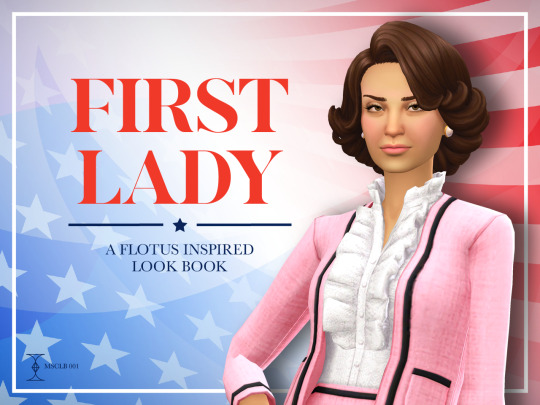
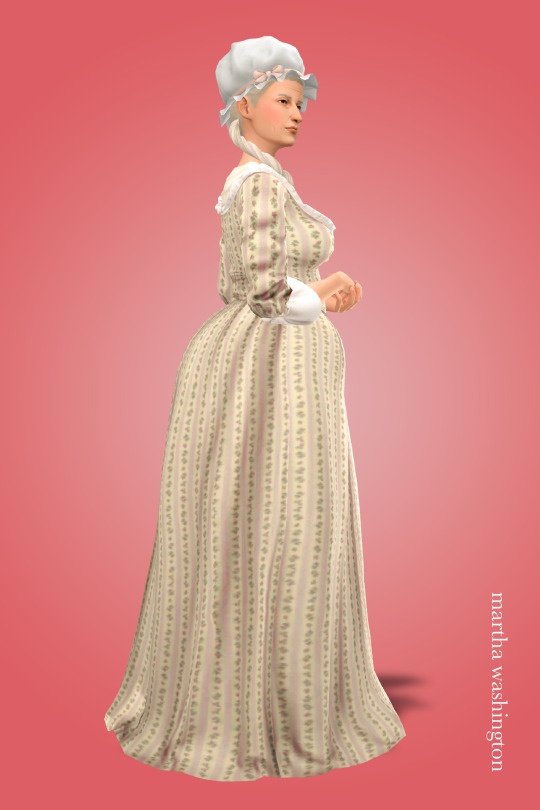







A big happy 4th of July to my American simmers! What better way to celebrate than by creating a look book showcasing some of the most notable and iconic first ladies?
CC links under the cut.
Martha Washington was the first first lady of the United States, although the title wasn’t coined until after her death. She took on the social role of the president's wife reluctantly, becoming a national celebrity in the process.
Mop Cap | Hair | Dress (Recolour) | Dress (Mesh - TSR) | Fichu (Scarf) | Watch (Vintage Glamour)
Louisa Adams was born in London and raised in France. In fact she was the only foreign-born first lady until Melania Trump. While serving she took to writing, producing plays, essays, poems, and an autobiography.
Hair | Earrings | Dress | Undershirt & Shoes | Socks (Get To Work)
Mary Todd Lincoln staunchly supported her husband throughout his presidency and was active in keeping national morale high during the Civil War. She was seated next to Abraham when he was infamously assassinated.
Hair | Earrings | Dress
Frances Cleveland is the only first lady to have served in the role during two non-consecutive terms. At just 21 years old when she first starting serving, she is the youngest presidential spouse in American history and the first to actually marry in the White House.
Hair | Dress (retired - direct download) | Gloves (My Wedding Stories)
Nellie Taft was a very progressive woman for her time and was closely involved in the political aspects of the presidency, regularly sitting in on meetings and serving as her husband's closest advisor.
Hair | Earrings | Choker | Dress | Shoes
Mamie Eisenhower was a popular first lady and recognized as a fashion icon, known for her iconic bangs and frequent use of the colour pink.
Hair | Earrings | Dress | Watch (Vintage Glamour) | Shoes (Base Game)
Jackie Kennedy (header) was regarded as an international fashion icon and her work as a cultural ambassador of the United States made her very popular globally. She established the White House Historical Association, which has had a lasting impact on the cultural landscape of the United States.
Hair (Nifty Knitting) | Earrings (Base Game) | Suit
Betty Ford was one of the most candid first ladies in history, commenting on the hot-button issues of the time such as feminism, equal pay, the Equal Rights Amendment, sex, drugs, and abortion. After undergoing her own recovery, she founded and served as the first chair of the board of directors of the Betty Ford Center for substance abuse and addiction.
Hair | Suit | Ring (My Wedding Stories) | Shoes (Base Game)
Michelle Obama worked as an advocate for poverty awareness, education, nutrition, physical activity, and healthy eating during her time as first lady. She also supported American designers and was considered a fashion icon.
Hair | Necklace | Dress | Shoes (Recolour) | Shoes (Mesh - TSR)
With thanks to some amazing creators: @buzzardly28 @simulatedstyles @rustys-cc @serenity-cc @wondercarlotta @joliebean @madlensims @sentate
#ts4#ts4 cc cas#the sims 4#ts4 lookbook#s4 lookbook#lookbook#the sims lookbook#ts4 decades challenge#ts4 historical#sims 4 decades challenge#1700s#regency#late victorian#edwardian#1950s#1970s#2010s#1800s#historical lookbook#decades lookbook
240 notes
·
View notes
Text
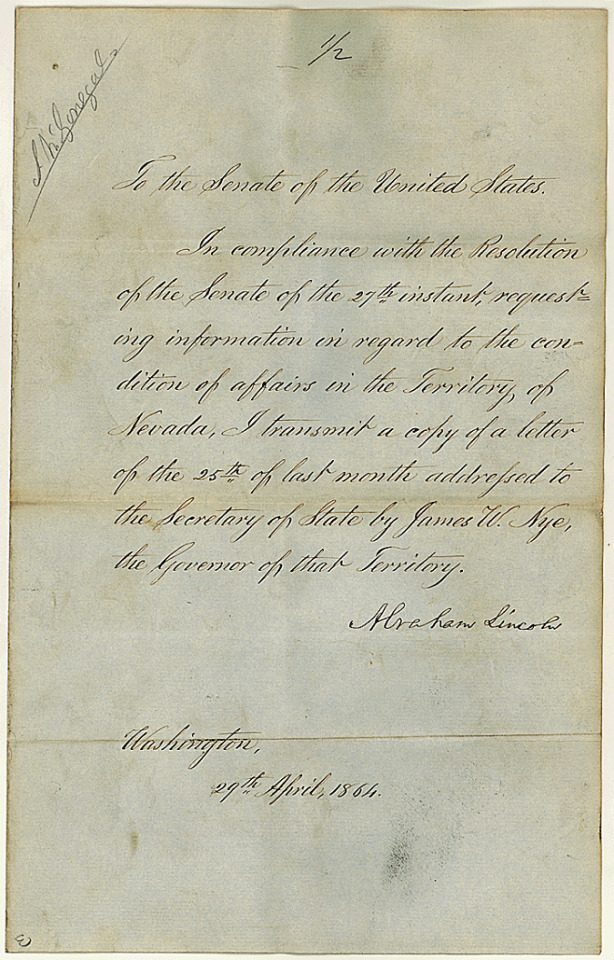
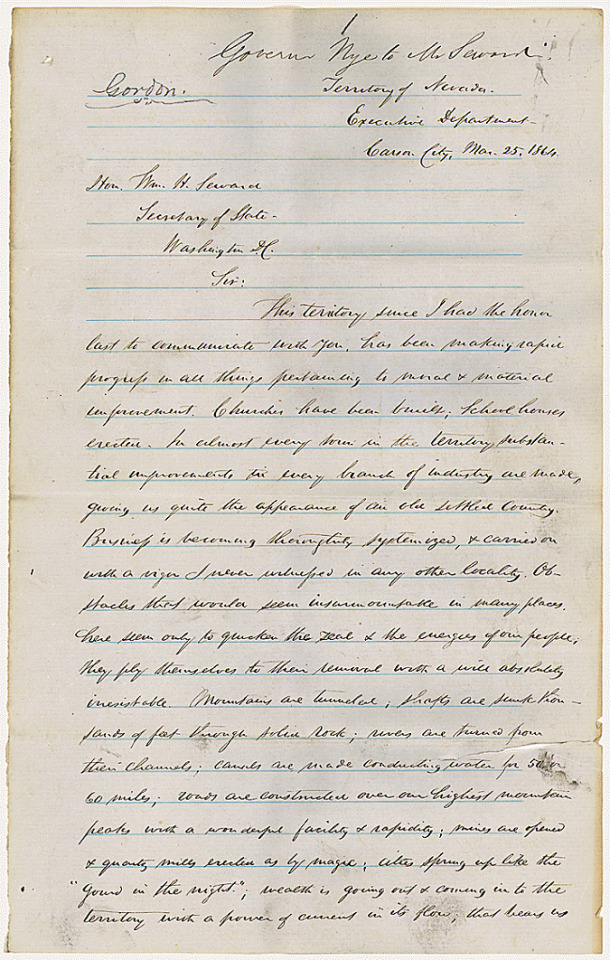
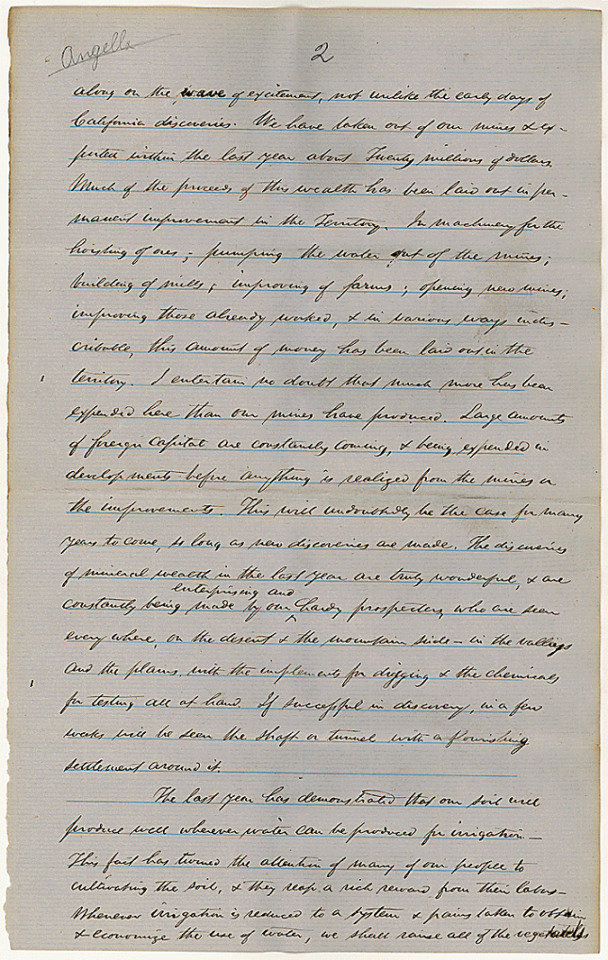

Presidential Message of Abraham Lincoln, transmitting a letter from James W. Nye, Nevada Territorial Governor
Record Group 46: Records of the U.S. SenateSeries: Presidential MessagesFile Unit: Presidential Messages to the 38th Congress Suggesting Legislation or Submitting Specific Information or Documents
[left corner] S. H. Sonegal [?]
[top center page] 1/2
To the Senate of the United States.
In compliance with the Resolution of the Senate of the 27th instant, requesting information in regard to the condition of affairs in the Territory of Nevada, I transmit a copy of a letter of the 25th of last month addressed to the Secretary of State by James W. Nye, the Governor of that Territory.
Abraham Lincoln
Washington,
29th April, 1864.
[top of page] 1
Governor Nye to Mr Seward
[left margin] Gordon. [right margin] Territory of Nevada
[right margin] Executive Department
[right margin] Carson City, Mar. 25, 1864
Hon. Wm. H Seward
Secretary of State
Washington D.C.
Sir:
This territory since I had the honor last to communicate with you, has been making rapid progress in all things pertaining to moral & material improvement. Churches have been built; schoolhouses erected. In almost every form in the territory, substantial improvements in every brand of industry are made, giving us quite the appearance of an old settled country. Business is becoming thoroughly systemized, & carried on with a rigor I never observed in any other locality. Obstacles that would seem insurmountable in many places, here seem only to quicken the pace & the energies of our people; they fly themselves to their reward with a will absolutely irresistable. Mountains are tunneled; shafts are sunk thousands of feet through solid rock; rivers are turned from their channels; canals are made conducting water for 50 or 60 miles; roads are constructed over our highest mountain peaks with a wonderful facility & rapidity; mines are opened & quartz mills erected as by magic; cities sprung up like the "gourd in the night"; wealth is going out & coming in to the territory with a power of current in its flow, that bears us
[full document and transcription at link]
35 notes
·
View notes
Text


Happy 113th birthday to #originalantifa#originalantifa Thomas Page! Thomas Page was born in New York City in 1910. After high school, he worked as a bootlegger and model during the Great Depression. He later became an organizer with the Unemployed Councils and joined the CPUSA. He arrived in Spain on April 8, 1937. He served with the Abraham Lincoln Brigade until he was wounded in action. Thomas (center in the second image) returned to the US on December 20, 1938. He served in the US Army during WWII. After the war, he took up photography and camera repair while working for the Bell Telephone Company. He was interviewed and featured in the documentary, The Good Fight.
#antifa#thomas page#original antifa#no pasarán#abraham lincoln brigade#spanish civil war#the good fight
79 notes
·
View notes